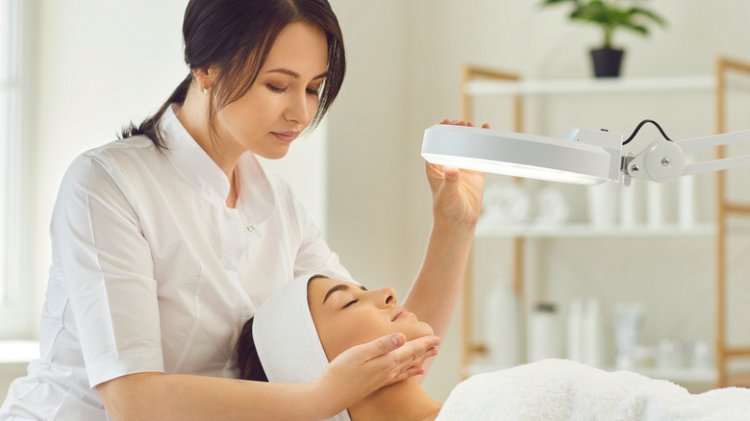Expert Dermatologist Advice for Healthy, Glowing Skin
Discover essential dermatologist advice for maintaining healthy, glowing skin. Learn skincare tips, common mistakes, and expert recommendations.
Share this Post to earn Money ( Upto ₹100 per 1000 Views )

1. Understanding Your Skin Type
Before diving into skincare products and routines, it's essential to understand your skin type. Dermatologists emphasize that knowing whether your skin is oily, dry, combination, or sensitive can significantly influence the effectiveness of your skincare regimen.
- Oily Skin: Prone to excess sebum production, which can lead to acne. Dermatologists recommend non-comedogenic and oil-free products to keep pores clear.
- Dry Skin: Lacks moisture and may feel tight or flaky. Opt for hydrating and moisturizing products with ingredients like hyaluronic acid and glycerin.
- Combination Skin: Features both oily and dry areas. A balanced routine with targeted products for different areas is ideal.
- Sensitive Skin: Easily irritated and reactive. Gentle, fragrance-free products are key to preventing irritation.
By identifying your skin type, you can choose products that cater specifically to your needs, enhancing the effectiveness of your skincare routine.
2. Daily Skincare Routine Essentials
A consistent daily skincare routine is the foundation of healthy skin. Dermatologists recommend a simple yet effective routine that includes the following steps:
- Cleansing: Use a gentle cleanser twice a day to remove dirt, oil, and makeup. Avoid harsh soaps that can strip your skin of natural oils.
- Moisturizing: Even if you have oily skin, moisturizing is crucial. Choose a moisturizer that suits your skin type to keep it hydrated and balanced.
- Sun Protection: Applying sunscreen with at least SPF 30 every day is non-negotiable. Sunscreen protects your skin from harmful UV rays, preventing premature aging and reducing the risk of skin cancer.
Consistency is key—by following this routine daily, you’ll build a strong foundation for healthy, glowing skin.
3. The Importance of Sun Protection
Sun exposure is one of the leading causes of skin damage, including premature aging, sunburns, and an increased risk of skin cancer. Dermatologists cannot stress enough the importance of sun protection.
- Broad-Spectrum Sunscreen: Apply a broad-spectrum sunscreen with SPF 30 or higher every morning, even on cloudy days. Reapply every two hours, especially if you're outdoors.
- Protective Clothing: Wear hats, sunglasses, and protective clothing to shield your skin from direct sun exposure.
- Seek Shade: Limit your time in the sun during peak hours (10 a.m. to 4 p.m.), and seek shade whenever possible.
Incorporating sun protection into your daily routine is one of the most effective ways to preserve your skin's health and appearance.
4. Addressing Common Skin Concerns
Dermatologists often encounter a variety of common skin concerns, from acne to hyperpigmentation. Here’s their advice on how to address these issues effectively:
- Acne: Avoid picking or squeezing pimples, as this can lead to scarring. Use products containing salicylic acid or benzoyl peroxide to treat acne and reduce inflammation. For persistent or severe acne, consider consulting a dermatologist for prescription treatments.
- Hyperpigmentation: Dark spots and uneven skin tone can be treated with products containing ingredients like vitamin C, niacinamide, and retinoids. Consistent use of sunscreen is crucial to prevent further darkening of spots.
- Dryness and Dehydration: Incorporate hydrating serums and creams into your routine, especially during colder months. Ingredients like hyaluronic acid and ceramides help lock in moisture.
Dermatologist advise tailored to these concerns can help you achieve clearer, more even-toned skin.
5. The Role of Diet and Lifestyle in Skin Health
What you put into your body can have a significant impact on your skin's appearance. Dermatologists highlight the importance of a balanced diet and healthy lifestyle choices:
- Hydration: Drinking plenty of water helps keep your skin hydrated from the inside out. Aim for at least 8 glasses a day.
- Diet: A diet rich in antioxidants, vitamins, and minerals supports skin health. Incorporate fruits, vegetables, nuts, and fish into your meals for a nutrient boost.
- Sleep: Adequate sleep is essential for skin repair and regeneration. Aim for 7-8 hours of quality sleep each night to allow your skin to recover and rejuvenate.
Incorporating these lifestyle changes can complement your skincare routine and lead to long-lasting results.
6. When to See a Dermatologist
While many skin concerns can be managed with over-the-counter products, there are times when it’s crucial to consult a dermatologist:
- Persistent Acne: If over-the-counter treatments aren't effective, a dermatologist can prescribe stronger medications.
- Unexplained Skin Changes: Sudden changes in your skin, such as new moles, rashes, or unexplained irritation, should be evaluated by a dermatologist.
- Skin Cancer Screenings: Regular skin checks are important, especially if you have a history of sun exposure or a family history of skin cancer.
Dermatologists can provide personalized advice and treatments that are tailored to your specific skin concerns, ensuring the best possible care.
Conclusion
Following expert dermatologist advice is the key to achieving and maintaining healthy, glowing skin. By understanding your skin type, establishing a daily skincare routine, prioritizing sun protection, addressing common concerns, and making healthy lifestyle choices, you can enhance your skin’s health and appearance. Remember, when in doubt, consulting a dermatologist can provide you with the personalized care and guidance you need to achieve your skincare goals.

 jaspermurphy1989
jaspermurphy1989 













